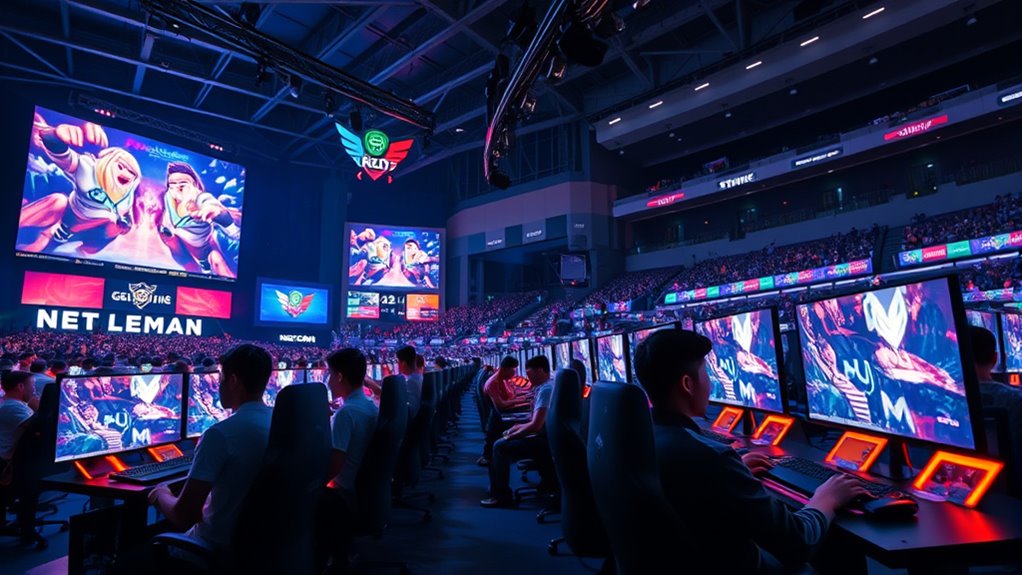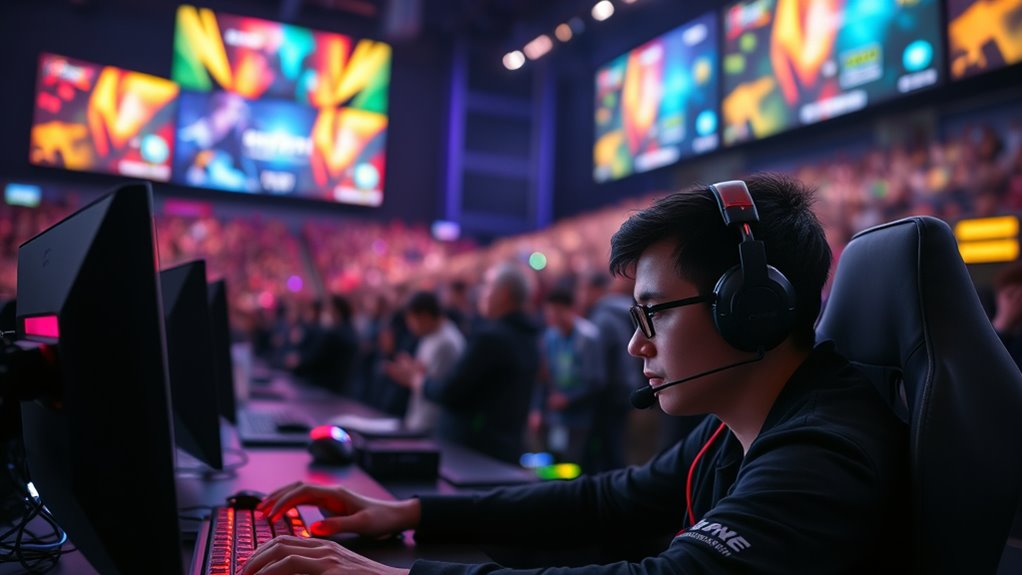Esports is competitive video gaming where skilled players or teams compete in popular titles like League of Legends, Fortnite, and Counter-Strike. Success depends on strategy, coordination, and individual skill, making each match exciting to watch. Understanding team tactics and player rankings can improve your appreciation of the game and its complexity. By exploring these elements, you’ll uncover how players evolve and teams succeed, leading you to even more fascinating insights into the world of competitive gaming.
Key Takeaways
- Esports involves competitive gaming with popular titles like League of Legends and Fortnite, requiring skill and strategy.
- Team strategies include role assignments and tactical adjustments that significantly impact match outcomes.
- Player rankings evaluate skill levels, guiding team placements and highlighting top performers.
- Analyzing gameplay helps teams improve tactics and provides fans with deeper understanding of matches.
- Understanding strategies and rankings enhances appreciation, making viewing more engaging and educational.

Have you ever wondered what esports really is? At its core, esports is competitive video gaming where players or teams go head-to-head in popular titles like League of Legends, Fortnite, or Counter-Strike. Unlike casual gaming, esports demands skill, coordination, and strategic thinking, turning gaming into a spectator sport watched by millions worldwide. Whether you’re a player aiming to improve or a fan curious about the scene, understanding how teams operate is key. Team strategies form the backbone of successful esports teams. They involve planning how players work together, assign roles, and adapt tactics mid-match. These strategies can vary widely depending on the game and team style, from aggressive pushes to defensive plays. Watching how teams implement their strategies gives insight into their overall approach and can influence the outcome of matches. Player rankings are another essential aspect. These rankings evaluate individual skill levels and are often used to determine a player’s position within a team or their eligibility for tournaments. Rankings are dynamic, fluctuating based on recent performances, and serve as benchmarks for skill progression. They also help fans and coaches identify standout players, understand team compositions, and make predictions about match results. If you’re interested in competitive gaming, paying attention to team strategies and player rankings can deepen your appreciation of the game. It reveals the complexity behind each match and highlights the importance of coordination and skill. They also serve as important benchmarks that motivate players to improve their performance and adapt to evolving strategies. Teams don’t just rely on raw talent; they analyze opponents, refine their tactics, and adjust strategies to overcome challenges. Coaches and analysts spend hours studying gameplay footage, identifying weaknesses, and crafting game plans to give their team an edge. As a spectator, observing these elements can make matches more engaging and educational. You’ll start noticing patterns, such as how teams execute coordinated attacks or defend key objectives. You might also see rising stars climbing the player rankings, showcasing their growth and potential. This competitive environment encourages players to hone their skills continuously, pushing the boundaries of what’s possible in gaming. Whether you’re watching an international tournament or following your favorite local team, understanding the importance of team strategies and player rankings will give you a clearer picture of what makes esports so exciting. It’s not just about individual talent but about how well a team works together and how players evolve over time. So, the next time you tune into a match, pay attention to the strategies at play and the rankings of the players on stage. These elements are what turn a simple game into a thrilling, high-stakes competition that captures the attention of millions around the world.
Frequently Asked Questions
How Do I Start My Own Esports Team?
To start your own esports team, focus on team management by recruiting skilled players who share your vision. Build a strong brand and establish a presence on social media. Seek sponsorship opportunities by reaching out to gaming brands or local businesses interested in supporting your team. Keep your team organized, communicate clearly, and stay dedicated to growth. With passion and effort, you’ll create a winning team in the competitive gaming scene.
What Equipment Is Essential for Competitive Gaming?
When it comes to competitive gaming, you need the right equipment to excel. You’ll want gaming peripherals like a precise mouse, responsive keyboard, and a good headset for clear communication. Strong internet connectivity is essential for smooth gameplay without lag. Additionally, a reliable gaming PC or console ensures consistent performance. Investing in quality gear boosts your chances of winning and keeps you comfortable during long gaming sessions.
How Are Esports Tournaments Organized and Funded?
Esports tournaments are organized through various tournament formats like single-elimination, double-elimination, or round-robin, depending on the event’s scale. Funding mainly comes from sponsorship models, which include brands, game publishers, and media rights. You’ll also see ticket sales, merchandise, and streaming rights contributing. These elements help create a well-structured competitive environment, ensuring players and organizers have the resources to host successful tournaments.
What Are the Top Esports Titles Worldwide?
You’re curious about the top esports titles worldwide, which span popular game genres like first-person shooters, MOBAs, and battle royales. These games attract top players who compete at the highest levels, drawing huge audiences. Titles like League of Legends, Counter-Strike, and Fortnite lead the charts, thanks to their engaging gameplay and competitive scenes. As you follow these games, you’ll see how top players shape the esports landscape and inspire new fans.
How Can I Become a Professional Esports Player?
Did you know that the average professional esports player trains over 8 hours daily? To become one, focus on refining your skills with targeted training strategies, like practicing specific game mechanics and analyzing gameplay. Build your reputation by streaming regularly and connecting with the community. Seek sponsorship opportunities early on, as they can provide funding and exposure. Dedication, consistent effort, and networking are key to turning pro in esports.
Conclusion
Now that you know the basics of esports, you’re ready to immerse yourself. Whether you start by watching tournaments like The International or try gaming with friends, remember that dedication and practice matter. For example, a beginner who dedicates time to analyze gameplay and improve skills could someday compete professionally. Keep learning, stay passionate, and enjoy the journey—esports is all about growth, teamwork, and having fun along the way.









